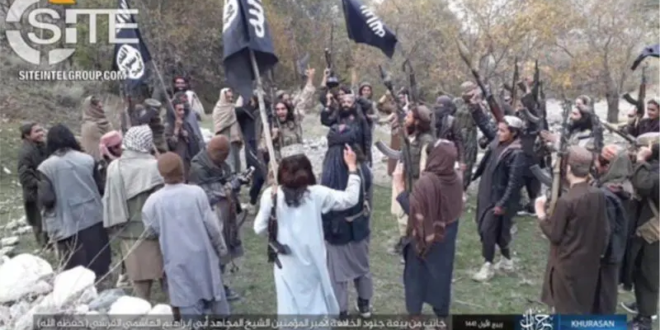The United States is assigning responsibility for Friday’s attack on a Moscow concert hall that killed more than 130 people on the Islamic State terror group’s Afghan affiliate, known as Islamic State-Khorasan, or IS-Khorasan.
A State Department official confirmed to VOA that the U.S. gathered intelligence suggesting IS-Khorasan was planning an “imminent” attack in the Russian capital, leading to a warning earlier this month from the U.S. Embassy in Moscow.
The official said U.S. intelligence indicates Friday’s deadly attack is the result of that plotting.
So far, the claims of responsibility for the Moscow attack have come from IS news agencies or from other IS core outlets, with one statement saying the attack was carried out by an IS network in Russia itself.
But U.S. and Western officials have warned repeatedly about IS-Khorasan’s intent to carry out strikes beyond Afghanistan’s borders.
“ISIS-Khorasan continues to harbor intent to conduct external operations and maintains English‑language media releases that aim to globalize the group’s local grievances among Western audiences,” U.S. Homeland Security Secretary Alejandro Mayorkas warned this past October, using another acronym for the group.
Last May, the U.S. director of national intelligence told U.S. lawmakers IS-Khorasan “remains intent on looking to do external attacks,” while other intelligence officials cautioned such attacks could take place within a year.
U.S. officials also have blamed IS-Khorasan for carrying out the deadly terror attack in Kerman, Iran, this past January. That attack involved twin bombings that killed almost 100 people.
“Regardless of whether ISIS’s branch in Afghanistan is responsible for coordinating this attack, the attack demonstrates ISIS remains a potent global threat,” said Michael S. Smith II, a terrorism analyst who specializes in jihadi influence operations.
“This further demonstrates there has been inadequate investments made in efforts to deny the group capabilities to orchestrate and otherwise mobilize mass-casualty attacks, including those perpetrated by supporters who have not undergone formal terrorist training,” Smith told VOA.
IS-Khorasan origins
One of the most active and violent regional affiliates of the Islamic State militant group, IS-Khorasan emerged in Afghanistan in late 2014. The group is named after an old term for the region that included parts of Iran, Turkmenistan and Afghanistan.
IS-Khorasan was founded by disgruntled members of the Pakistani Taliban, the Islamic Movement of Uzbekistan and other groups who pledged allegiance to IS. The terrorist group’s membership has dropped since peaking in about 2018, partly because of efforts by the Taliban and the United States to dismantle it.
U.S. officials have in the past put the number of IS-Khorasan fighters at several hundred. But intelligence shared by United Nations member states suggests the tally may be much higher, with a core group of 1,500 to 2,200 fighters in Afghanistan’s Kunar and Nangarhar provinces.
Additionally, observers in the region have warned that IS-Khorasan also has begun looking beyond Afghanistan itself and is attempting to gain footholds in Kazakhstan, Kyrgyzstan and parts of Tajikistan.
Surging peril
Ian McCary, the U.S. State Department deputy special envoy to the Global Coalition to Defeat ISIS, said Thursday at the Washington Institute for Near East Policy, “We are clear-eyed about the continuing threat ISIS poses.”
“We see the emergence of ISIS affiliates — the so-called ISIS-Khorasan inside Afghanistan, which poses an external threat,” McCary said.
“ISIS-Khorasan doesn’t only want to blow up maternity hospitals and schools, and kill women and children,” McCary said, adding that the group is looking to create “mayhem outside of Afghanistan, as well … They have a very nihilistic vision.”
U.S. officials expressed concern about the growing threat posed by IS-Khorasan back in 2022.
IS-Khorasan has carried out numerous attacks inside and outside of Afghanistan since its founding.
In 2021, the group carried out an attack at Kabul’s international airport, killing 13 U.S. troops and 170 Afghans during the U.S. withdrawal from Afghanistan.
Taliban affiliation
IS-Khorasan has significant disagreements with the Taliban, which it views as having abandoned jihad. IS-Khorasan continues to pose a threat to the Taliban’s authority in Afghanistan.
The brutal attack in Moscow isn’t the first time IS-Khorasan has targeted Russia. In 2022, IS-Khorasan militants claimed responsibility for a deadly suicide bombing at the Russian Embassy in Kabul.
Some analysts say they believe IS-Khorasan has targeted Russia over what the terrorist group views as the Russian government’s oppression of Muslims, including in Afghanistan, Chechnya and Syria, according to reports.
Since Friday’s attack in Moscow, Russian authorities have detained 11 people, including four suspects directly involved in the assault, according to media reports.
 Eurasia Press & News
Eurasia Press & News




